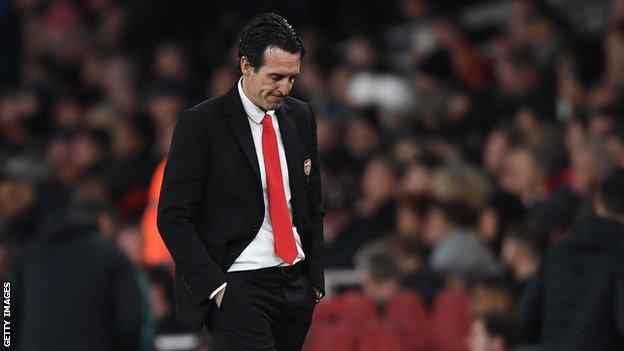Arsenal sack Unai Emery: What went wrong for Spaniard and was it all his fault?
- Published

Emery won 55% of his 78 games in charge at Arsenal
Arsenal's decision to sack Unai Emery after only 18 months in charge is another example of a club and a manager failing in the almost impossible task of plotting the succession of a legend.
Manchester United are the extreme example - when Sir Alex Ferguson stepped down after 26 years and 38 trophies he was followed by the flawed choice of David Moyes, out of his depth and dismissed after 10 months.
Emery arrived in May 2018 to succeed Arsene Wenger - who had been at Arsenal for 22 years - with a track record of European success with Sevilla and domestic titles with Paris St-Germain, but has failed to move the club out of the Frenchman's shadow.
So how has it all gone wrong for Emery and Arsenal?
Emery failed to cure Arsenal flaws
Wenger's time was up at Arsenal - few would argue with that despite a magnificent career which brought three Premier League titles, seven FA Cups and the domestic Double in 1998 and 2002.
Emirates Stadium had become a toxic arena with public displays of disaffection for the great manager as Arsenal languished in the shadow of Liverpool, Manchester City and others in the fight for domestic supremacy.
Emery, with his record of three successive Europa League wins at Sevilla and titles with PSG, emerged ahead of Mikel Arteta at the last moment as the man to clear the air, to move Arsenal out of Wenger's giant shadow and plot a route forward.
He failed on all counts. There were shafts of light, such as a 22-match unbeaten run last season and a Europa League final appearance when Arsenal were heavily beaten by Chelsea, but all dawns were false.
Emery, for all his pedigree, never got to grips with the task and the biggest condemnation is that all Arsenal's obvious and long-standing flaws remained as unaddressed on the day he left as when he arrived.
Arsenal, under Wenger, were infamous for their soft centre and propensity for collapsing under pressure, especially away from the Emirates. Emery never got near solving this problem.
And the stats were painful. Arsenal's current seven-game winless streak which saw Emery off is their worst since February 1992 under George Graham. Wenger took charge of 1,235 matches but never suffered this.
Arsenal won exactly the same number of points (88) in Emery's 51 games as they did in Wenger's last 51. He leaves with them eighth, 19 points behind leaders Liverpool and eight points off the Champions League places.
Emery built his Arsenal on suspect foundations: the summer signing of David Luiz from Chelsea to allegedly add defensive stability as heavily laced with irony as it was with risk.
The signing of Matteo Guendouzi, the 20-year-old French midfielder, was an early success but this summer's £72m record signing from Lille, Nicolas Pepe, has failed to deliver while Kieran Tierney arrived from Celtic injured and has so far struggled to get going.
In short this has been, as the fans used to sing in happier times, "Same old Arsenal" - but not in a good way.
Arsenal had firepower in the shape of Alexandre Lacazette and Pierre-Emerick Aubameyang but even their threat could not compensate for Emery's failure to stiffen Arsenal's resolve.
Quite simply, Arsenal remained just as soft as they were under Wenger. In the 2-2 draw at Watford earlier this season, the Hornets attempted 31 shots on target, the highest the Gunners have faced since Opta starting compiling such statistics in 2003-04.
Emery's away record, as it had been before in his career, was abysmal and showed no signs of improving. Arsenal won seven and lost eight of their 19 games last season and this season have won one of six.
It was an acute case of travel sickness. Emery had no cure - and ultimately paid with his job.
Communication breakdown
It is one of the cheapest shots in the book to mock a manager's command of English when he arrives in the Premier League - and Emery made every effort to communicate in that manner from the moment he arrived at Arsenal.
There is no question, however, that Emery struggled to get his message across to players and supporters, not only making life difficult on the training ground but also in establishing a connection with fans, so important for a new manager, especially one who was almost ingrained in the bricks and mortar of Arsenal as Wenger was.
He was, however, professional and the model of dignity at all times, even under fierce questioning.
Emery's strategy and communication was also flawed elsewhere, notably when it came to selecting a new captain to succeed the departed Laurent Koscielny.
Instead of being decisive and naming his captain, he ended with a botched players' vote that elected Granit Xhaka, a divisive figure among fans as both a personality and player who had failed to justify a £35m fee when he arrived from Borussia Monchengladbach in May 2016.
It was an accident waiting to happen and duly arrived in October when Xhaka was involved in an angry confrontation with fans when he was substituted in the 2-2 draw against Crystal Palace, exposing Emery's selection process and undermining the manager further.
Xhaka, ironically, was rehabilitated in Emery's final defeat against Eintracht Frankfurt but his bust-up with fans came as the credits were rolling for the Spaniard.
Emery also had a fractured relationship with Arsenal's maverick superstar Mesut Ozil, although this was understandable given the lack of return on the German's reported £350,000-a-week contract.
Arsenal's fans also fell out of love with Ozil - but then used his absence as another stick to beat a manager who tried his best but never convinced.
This, along with bad results, players who were clearly disengaged from the manager's approach, and growing fan anger, created a perfect storm around Emery that he could never clear.
Is it all Emery's fault?
Emery must take much of the responsibility but he was operating at a club that looks like it is suffering from terminal inertia under owner Stan Kroenke.
Kroenke is almost an absentee owner, seemingly unwilling to invest the sums needed to compete with others chasing the big prizes, although his son Josh has communicated with supporters and addressed concerns.
Against this backdrop of inaction, will a new Arsenal manager actually change anything unless the board alters its approach?
How was Ozil awarded such an eye-watering contract given his known inconsistency? Why - and this was a hugely damaging decision - was Aaron Ramsey allowed to leave on a free transfer to join Juventus, despite his insistence he thought he had agreed a new deal?
Between Emery and Arsenal's hierarchy, the club has been allowed to become dysfunctional and the manager's number was up - if it was not already - once there were thousands upon thousands of empty seats at Emirates Stadium for Thursday's Europa League game.
Arsenal are in a mess and the concerns of supporters were voiced as recently as Sunday when a number of prominent supporters' groups united to issue a statement calling for "urgent action" to halt the "alarming and desperate state of things."
A petition started in the summer expressing similar sentiments garnered 120,000 signatures.
The urgent action demanded has been delivered.
As well as Arsenal's board, pressure will now mount on former star and technical director Edu and particularly on Head of Football Raul Sanllehi, the latter already a target for fans' frustration. Their reputations are also on the line.
Emery has gone - but he is not the sole culprit and it will take a sea-change in ambition and standards behind the scenes to provide the re-invigoration Arsenal supporters demand from the Kroenke regime.
